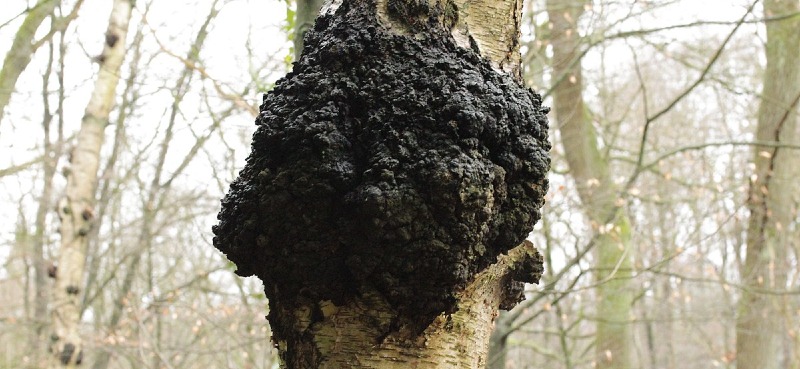
In an updated review of the medicinal value of the Siberian native fungus called chaga, international researchers underscored the almost unbelievable value of this humble organism for functional medicine.
Their review, synthesizing old and brand new studies on chaga, describes its anticancer, antioxidant, anti-diabetic, anti-inflammatory, antimicrobial, and immunomodulating properties as “remarkable.”
As World at Large reports, there is a very wide, very blurred line separating food from medicine. Nearly all known diseases are diagnosed alongside nutrient deficiencies, from bone cancer to sepsis.
While no one suffering from a migraine or eczema is running to the kitchen, clinical deficiencies in certain micronutrients may be the underlying or exasperating causes of many maladies.
As part of eating for health, nutraceuticals—sometimes called “functional foods”—which define the blurred line mentioned above, are of great interest. Mushrooms are certainly included in this category.
Chaga is not a mushroom as we would recognize it, but a white rot fungus that grows on trees rather than up from the soil. It’s found in North America, Siberia, and Scandinavia, and has a traditional history of use as medicine. It’s boiled in tea and consumed to treat inflammation and cancer in native cultures across Russia, for example.
Chaga possesses a panoply of polyphenols and triterpenes, also known as phytonutrients, (compounds contained in plants), many of which have already been established as medicinal in their antibacterial, anti-toxic, antioxidant, anti-cancer, antiviral, hypoglycemic, hepatoprotective, and immuno-modulatory effects.
These include betulinic acid, betulin, ergosterol peroxides, caffeic acid, inonoblin B, trametenolic acid, lupeol, lanosterol, inotodiol, and melanin.
Chaga, like all mushrooms, contains beta-glucans as its principal source of fiber. Beta-glucan is probably the most fortifying and beneficial type of fiber humans can consume, but is present in the largest quantities in mushrooms. A great source of fiber helps modulate the immune responses originating from the gut, prevent colon and stomach cancers, and reinforce the mucus lining on the inside of the GI tract, thereby preventing gut-borne pathogens from seeping into the bloodstream.
Part of chaga’s nutriceutical arsenal are betulin and betulinic acid. These names refer to the birch tree (Betula) and the chaga likely gathers these compounds from its parasitical relationship with the hardwood.
“Betulin has anticancer activity and is used for the treatment of wound healing. Derivates of betulin stimulate collagen synthesis in normal human fibroblasts. Betulin can be easily converted into betulinic acid, a compound that has anti-malarial, antifungal, anticancer, and anti-inflammatory activity,” the authors write.
“Betulin and betulinic acid are the most effective compounds used against skin inflammation. Betulin, betunilic acid, and their derivates can be used against melanoma skin cancer, epidermoid carcinoma, and actinic dermatosis.”
ALSO CHECK OUT: Vitamin D Improves Immunity to Cancer And Reduces Tumor Growth in Mice, Study Finds
The anti-cancer effects are particularly noteworthy. The authors continue…
“Furthermore, triterpenoids, such as inotodiol and ergosterol peroxide, found in [chaga] have exhibited anti-cancer properties by inducing apoptosis, inhibiting cell proliferation, and suppressing angiogenesis. Similarly, the compound called 3,4-dihydroxybenzalacetone has been found to have anticancer properties.”
EATING FOR HEALTH: Holy Mackerel! Fish Really Is Brain Food – Even if You Only Eat a Small Amount
“It can regulate the expression of genes that promote anti-apoptosis and cell proliferation. Additionally, [chaga] produces polyporenic acids, including inotolic acid, which have shown promising anti-cancer effects by inhibiting cancer cell growth and inducing cell cycle arrest.”
“Water extract of chaga mushroom exhibited a potential anticancer activity against B16–F10 melanoma cells in vitro and in vivo through the inhibition of proliferation and induction of differentiation and apoptosis of cancer cells,” they write.
MORE STORIES LIKE THIS: Porcini Mushrooms Rank Among Highest in the World for Rare ‘Essential Vitamin’
Chaga is one of a host of popular health-promoting fungi species, and is certainly one of the most researched. It’s often taken as a supplement because most humans don’t live close enough to the Arctic Circle to find chaga in the wild.
Picking a supplement should be done with care, however, as the supplement industry is filled with hucksters, contaminated products, and scams. Beyond these rudimentary challenges, picking the right chaga supplement would also involve ensuring you’re getting a product that is made with actual mushrooms, or is at least mostly mushrooms, rather than the mycelium.
SHARE This Nutraceutical Review With Your Friends Who Are Crazy About Health And Fitness…
Editor’s Note: A previous version of this story stated that beta-glucans are only found in mushrooms. The statement has been corrected.



















